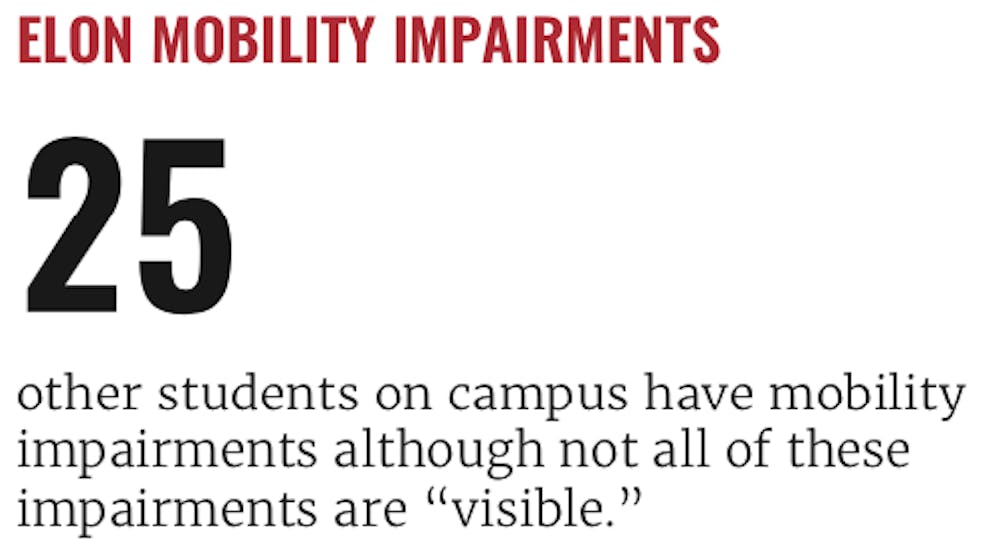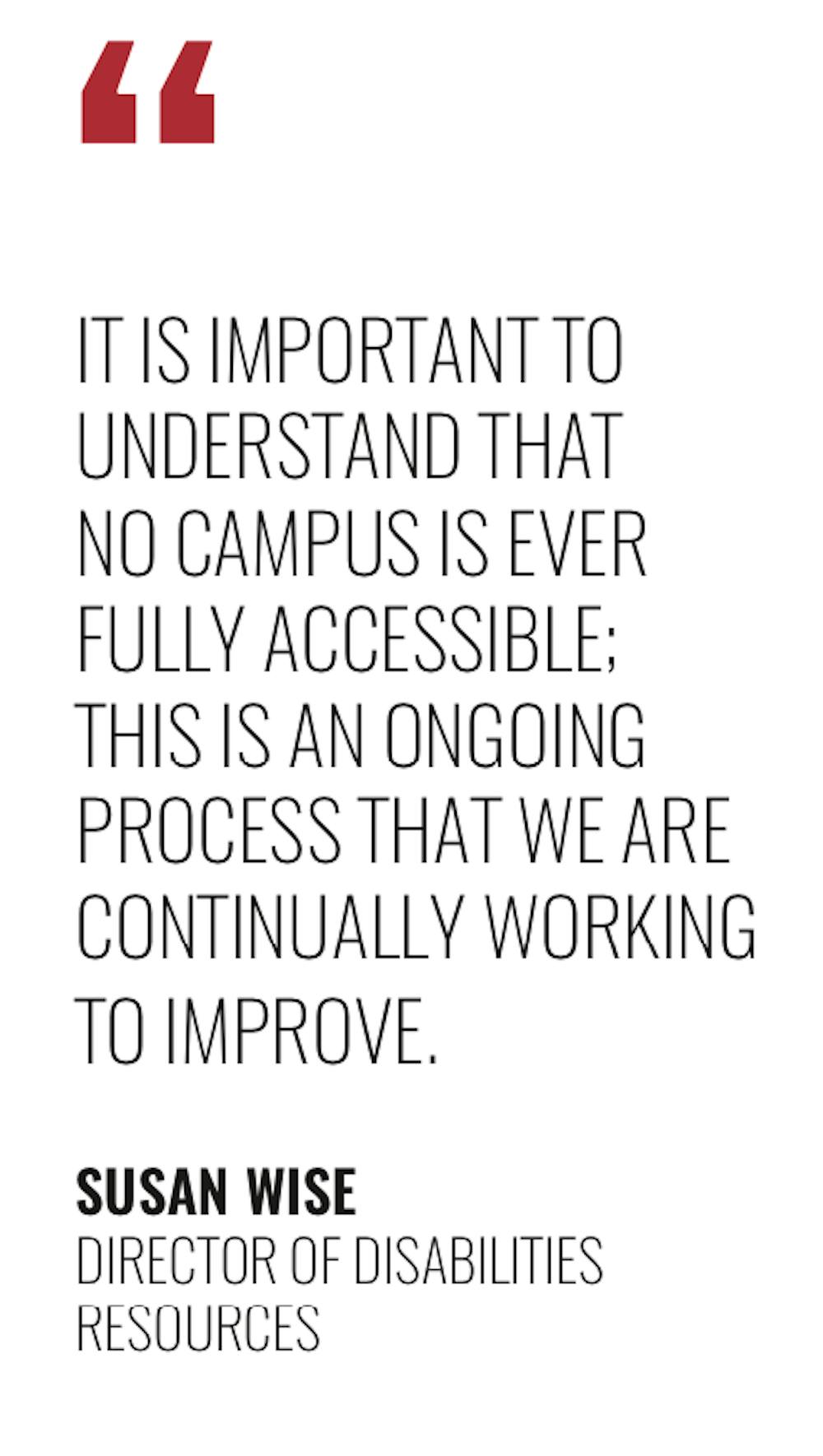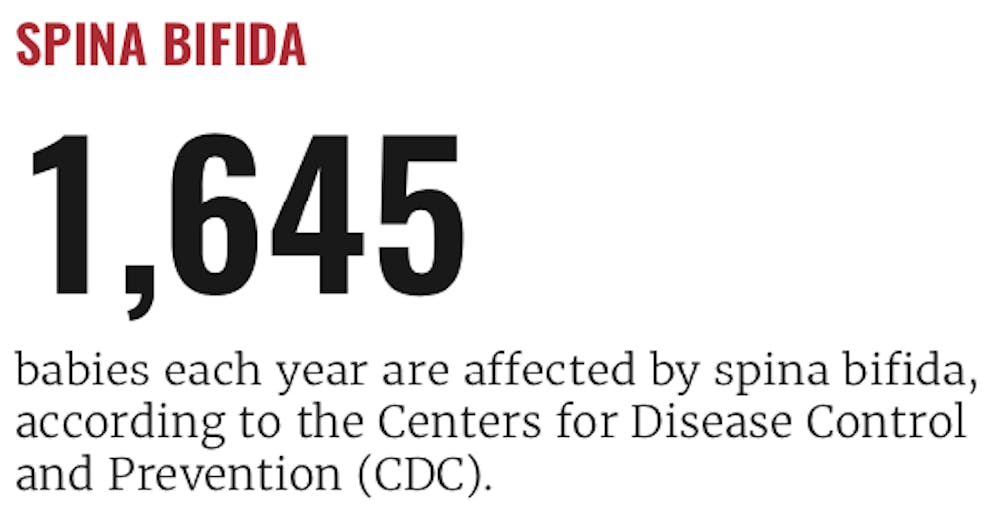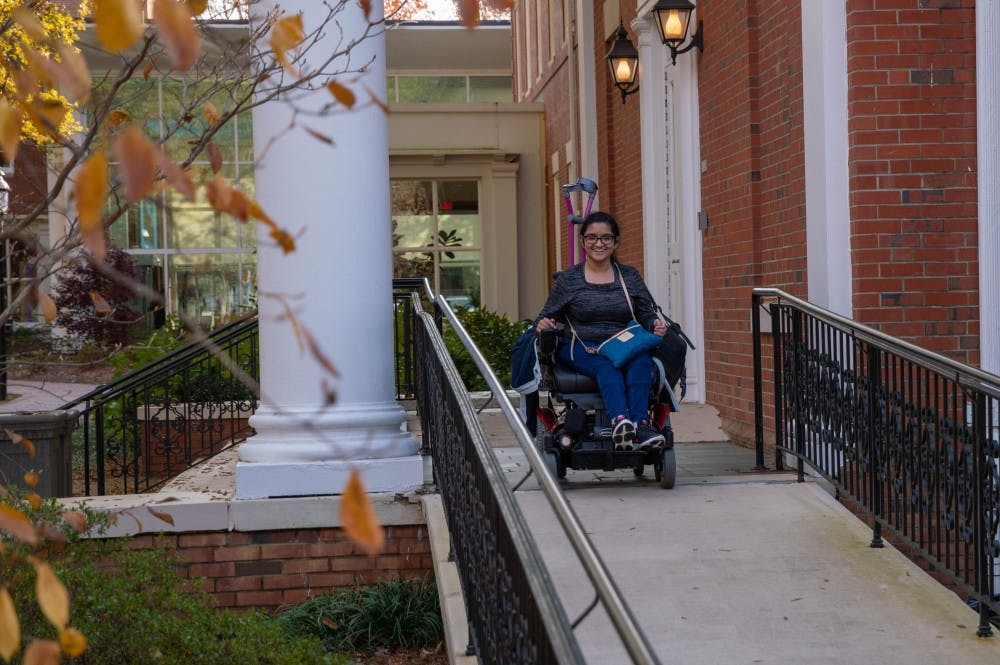Misbah Chhotani, a sophomore psychology major, has found a strong community at Elon University. She chose to attend the university because of her connections with Elon students during her high school years in Burlington, and continues to stay involved through Young Life, InterVarsity and ElonThon. Despite her clear sense of inclusion, one factor sets her apart from other Elon students.
Chhotani says that she is one of few Elon students with a physical disability.
In a written statement, Susan Wise, director of Disabilities Resources and an assistant professor, said there is one documented wheelchair user, one documented electric scooter user and approximately 25 other students with mobility impairments on campus. But Wise noted that not all of these impairments are “visible.”
Chhotani has spina bifida, a condition in which the spinal cord fails to develop properly after birth. The Centers for Disease Control and Prevention (CDC) estimates that the condition affects 1,645 babies each year, making the condition as rare is as it is individualized.

Although some who struggle with spina bifida aren’t able to walk at all, Chhotani is able to walk with crutches and uses a motorized wheelchair the rest of the time. But even with her fortunate mobility, some campus facilities are harder to access than others.
Some doors prove challenging for Chhotani to open, such as the pull doors in the back of Moseley and El Centro or those without functional automatic-open buttons. Bathroom doors are no exception.
“So, going in[to the bathroom] is not a problem because I’m in a motorized wheelchair, so I don’t have to use my hands to control the wheelchair so I can just push with my hands basically, but if I was in a manual wheelchair, it would be definitely harder because I’d be trying to use my hands for the chair but also try to push the door, and I don’t have enough hands for that,” Chhotani said. “But also, once you’re in the bathroom, trying to go through the door with my chair is just as difficult
a task.”
Buildings without access ramps or elevators are a concern as well. Chhotani said that she may not be able to enter buildings like Powell, which have steps leading up to the front door. The layout of some residential buildings have also prevented her from seeing her friends.
“I feel like, especially as you get older, like junior and senior year, a lot of people move to apartments and off-campus housing like Mill Point and stuff. There are some Mill Point buildings that I can’t visit, or some of my friends live in Danieley, and they live on higher levels of Danieley, and I’m not able to just go visit them and sit in their apartment at night,” Chhotani said. “So those kinds of things, those hangouts, we have to come up with a new way of a hangout, but it’s definitely a struggle trying to just relax on a campus or relax on a Friday or Saturday night with friends in their apartment building, because I just can’t get into their apartment building if it doesn’t have an elevator.”
Although Elon’s campus is far easier to navigate than others she looked at during her college search, Chhotani said the lack of accommodations on campus may be due to a lack of demand.
Wise said accommodations are considered as-needed.
“Accommodations provided to students with physical disabilities are determined on a case-by-case basis and are based on the needs of the student,” Wise said. “This includes physical access to classroom buildings, residence halls and other university buildings. Keep in mind that students with physical issues may also need other types of accommodations. Again, it depends on the needs of the student. This might include things like the provision of texts in alternative formats, extended time on exams, technology/software use for exams. ... We might also move the location of classes if needed.”

Wise also said that Disabilities Resources is “very responsive to student concerns.”
But Chhotani has reached out to Disabilities Resources several times in hopes of making some changes. She said that the staff are “definitely not as accessible and definitely not as responsive” as she expected.
“I think it’s more of a conversation, like a communication type thing. I feel like when I do express concerns of needing accommodations that they don’t have the resources for or they can’t because of liability issues, I feel like there’s not much of a conversation going on,” Chhotani said. “I would like more resources if they can’t help me because of liability issues, like giving me resources that I can reach out to for people who can help me instead of just saying a flat
out no.”
Those resources may include a safer way for Chhotani to navigate campus in bad weather, or more inclusive campus activities which don’t include a physical component.
Chhotani also hopes to be able to live on campus at some point.
“Because I knew that I was coming to Elon with financial issues and everything, I knew that I wanted to stay at home, but I definitely did want to do — I’ve had conversations with my parents that I definitely do want to do at least one year [living] on campus just to have that full college experience, so we’ll see if that is able to work with accommodations and everything and housing,” she said.
Wise said Disabilities Resources is working to keep campus facilities accessible to everyone, regardless of disability.
“Generally speaking, this campus is fairly accessible. When we are made aware of physical accessibility issues with a space, we do our best to remove the barriers to access the space. It is important to understand that no campus is ever fully accessible; this is an ongoing process that we are continually working to improve,” Wise said.

Chhotani and some of her friends, who are equally passionate about physical disability advocacy, signed up to be a part of implementing the university’s new Strategic Plan, with the goal of starting a conversation. Although she appreciates efforts to raise awareness about mental disabilities on campus, she believes there’s more work to be done with the physical disabilities aspect.
She believes the university “could do more to bring in more of a disability population.”
“We definitely do have new movements for mental disabilities, which I love, because I’ve met people and I’ve been affected by people with mental disabilities, so like, I’m all for mental disabilities and the mental health movement,” Chhotani said. “I think that’s great, but I just haven’t seen a physical disability kind of movement [like] a mental health one.”


